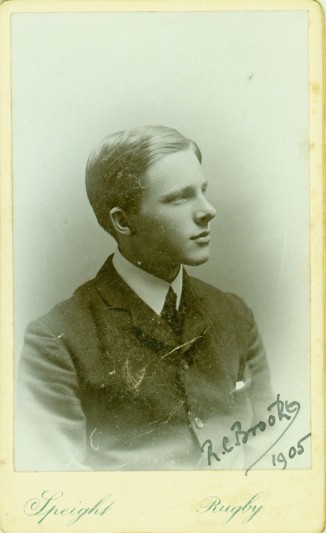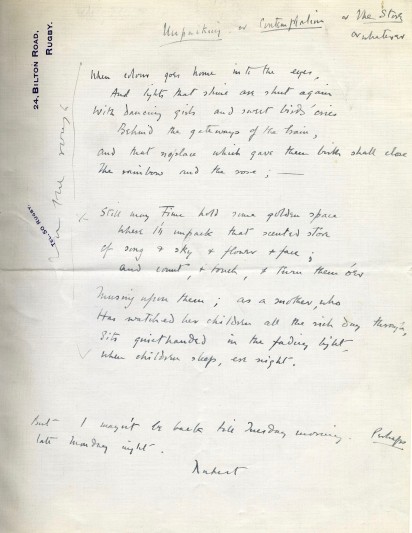When the already famous poet Rupert Brooke died on the eve of the battle of Gallipoli, his personal papers were divided between his two executors: his mother, and his friend Sir Edward Marsh. In 1930 Mrs Brooke bequeathed the papers in her ownership to his old Cambridge college, King’s College. Marsh’s papers about Brooke passed to his executor, who sold them to John Schroder, who continued to collect Rupert Brooke books and papers all his life. With generous gifts from the National Heritage Memorial Fund, Friends of the National Libraries and private donors, King’s College, Cambridge, acquired the Schroder collection of Brooke papers in 2015, creating a single Brooke archive from the two largest and most significant collections.
The Schroder collection includes the letters Eddie Marsh received from Brooke’s friends when writing his memoir of Brooke, as well as letters between Brooke, Marsh and a mutual friend, the composer Denis Browne. Browne died of wounds received at Gallipoli, and his letters to Marsh are minor masterpieces. His account of Brooke’s burial in 'one of the loveliest places on this earth, with grey-green olives round him, one weeping above his head: the ground covered with flowering sage, bluish grey & smelling more delicious than any other flower I know’, is justly famous. Brooke wrote many of his own best letters to Marsh during his travels to America and the South Seas. The last letter Rupert Brooke ever wrote is part of the collection, as is the eyewitness testimony about Brooke’s last hours, as recorded by ‘Cleg’ Kelly and provided to Marsh for his memoir.
The papers shed new light on Brooke’s avid interest in the theatre. Letters to Eddie Marsh from Cathleen Nesbitt, the actress and one of Brooke’s last loves, complement those she wrote to Brooke now held in the British Library.
The papers include 170 original letters written by Brooke to his intimate friends. Some were not published in the edition of Brooke’s correspondence by Geoffrey Keynes; many, it turns out, were bowdlerised in an effort to preserve Brooke’s reputation as a hero-poet. The Schroder collection includes the publishing history for both Brooke’s poetry and for Marsh’s memoir, which sold over 100,000 copies. The papers reveal the enterprising collaboration between Marsh and Frank Sidgwick that ensured the phenomenal sales of Brooke’s poetry in the ten years after his death. The poems have never gone out of print and Brooke’s legend endures; he is as popular as ever today.

